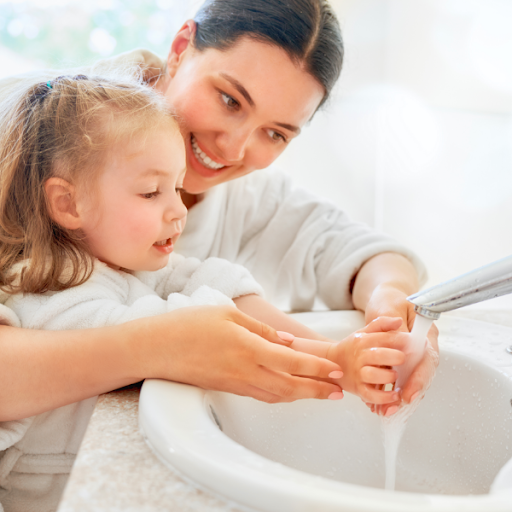How can we protect children from infections?
A low state of immunity and first-time exposure to many germs are the primary reasons why children require extra protection. In addition, they are exposed to more infections and illnesses from an early age because they play in different environments.
Shared environment settings, proximity, and sharing of toys that are contaminated with saliva, urine, or feces are one of the primary causes why children fall sick more often these days due to various infections.
We all have a vital part to play in protecting our children from infections by knowing how to react to children suffering from illness and taking necessary actions to stop the spread of infections.
Basic hygiene habits to adopt at home, daycare, and school
Here are some basic hygiene habits for children to reduce the risk of acquiring infections.
- Teach your children how to wash hands correctly with an antibacterial soap or liquid hand wash because clean and germ-free hands are the most effective way of preventing infections.
- Teach your children to cough or sneeze into the crevice of their elbow, and immediately wash their hands afterwards, or use hand sanitizer if water and soap is unavailable.
- Sharing personal items is also one of the most common ways of transmitting germs and infections. Teach your children not to share personal belongings such as hats, glasses, toothbrushes, bottles, or even food items.
- Tell children to always use clean, dry paper towels or tissues and avoid using tissues or paper towels used by other children.
- Instruct children not to touch other children's blood, urine, stool, saliva, or other drainages. Teach them to inform an adult caregiver if another child is accidentally bleeding, urinating, or passing a stool.
Basic hygiene habits to adopt in public areas
Public places such as playgrounds, restaurants, hospitals, airports, etc., are the most high-risk places to contract an infection. But you can teach your children healthy hygiene habits to reduce the risk of infections.
- Avoid individuals who display signs of apparent illnesses such as frequent coughing or sneezing.
- Don’t let strangers touch your children.
- Do not let children eat or touch their mouth, nose, or face until their hands are thoroughly washed with either an antibacterial soap or liquid hand wash.
- If your child is in daycare, ensure good hygiene and cleaning practices are followed, including disinfection through multi-surface cleaners and antiseptic liquid cleaners.
Additional infection control guidelines for children
- Daily bathing and linen changes are essential to lower your child’s risk of exposure to germs that can cause infections.
- Maintaining good oral healthcare is also essential for protection against mouth infections such as thrush. Ensure your child is brushing his teeth after eating, drinking, and before bedtime.
- If your child is suffering from a rash after getting exposed to anyone with chickenpox (varicella), shingles, or measles, do consult a medical professional immediately.
- Keep your child away from animals that are not pets since they carry germs and aren’t vaccinated.
Luckily, not all infections, such as ear infections, are contagious. In these cases, there’s no need to separate your child from the other children. Instead, teach your children about hygiene in a fun way so that they listen to you and actually adapt those healthy hygiene practices.
